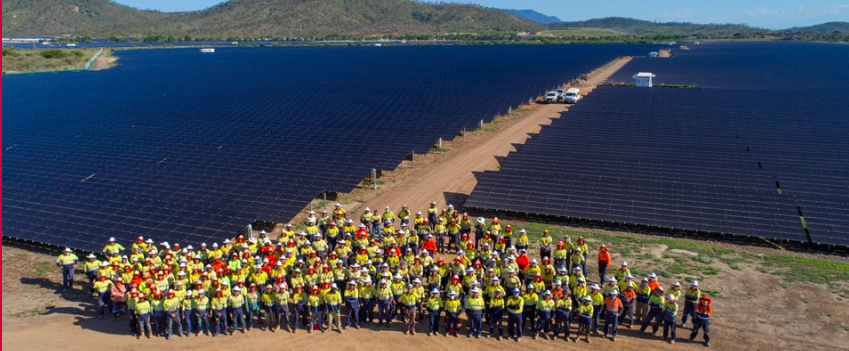The solar Engineering Procurement and Construction (EPC) business has never been an easy one. With mounting signs that achieving final project commissioning is remaining problematic in Australia, it appears as if a major player in the marketplace is feeling the pinch.
RCR Tomlinson had indicated it would announce its 2018 financial results today, however the Australian Financial Review (AFR) is reporting that this has now been delayed. The AFR points to a “problematic solar contract” as being behind the move, noting that: “Worryingly, no new date [to report] was given.”
With over 3,400 employees and a history dating back to 1898, RCR is no solar upstart, and has pushed aggressively into PV project construction. It carried out EPC duties on the landmark 124 MW Sun Metals solar project in Townsville – which was officially opened earlier this month.
However, it has encountered difficulties of late. On August 1, RCR requested a voluntary suspension in the trading of its shares while it carried out a review of “cost overruns that were recently discovered on a project, which are expected to have a material negative impact” on its 2018 earnings.
One week later RCR requested an extension of that suspension, and announced that its Managing Director and CEO Paul Dalgleish was stepping down. In its official request for the extension, RCR confirmed that the measures were being taken with respect to “cost overruns…[that] occurred at a single project, nearing completion.”
Today, RCR Tomlinson missed the indicative date it had given for the delivery of its full-year results.
Without wanting to comment on the particulars of any specific company nor project, analysts from Rystad Energy said that the Australian EPC marketplace is tough, and commissioning delays are causing significant headaches.
“As we flagged in our Solar EPC Market Report last year, the EPC sector in Australia has become highly competitive, leading to rapidly falling EPC prices. This will have resulted in pretty thin margins for EPC contractors,” Rystad’s Ben Willacy told pv magazine Australia.
“This is likely to be exacerbated by delays in project commissioning. Most solar projects currently under construction are taking longer to be commissioned than we had anticipated.”
Behind the delays are stringent conditions that AEMO is placing on project developers and EPCs, in the process of gradually ramping up a project towards full commissioning.
“It is probably taking longer for projects to get from energisation to full commissioning than most participants had anticipated,” said Willacy. “If it is also taking longer than has been stipulated in the EPC contract, then the EPC contractor may face liquidated damages to compensate the project developer for lost revenue.”
RCR Tomlinson is far from being alone in facing serious delays. pv magazine Australia has spoken to large international solar developers that have also encountered serious difficulties in the commissioning process.
Bruce James, an RCR Independent Non-Executive Director, is currently acting as the company’s CEO.
Update: A spokesperson for RCR Tomlinson has confirmed that the company is “carefully and methodically” working through all of the issues pertaining to the project. There is no set timetable for the company to report, however it is expected in the coming weeks rather than months.
This content is protected by copyright and may not be reused. If you want to cooperate with us and would like to reuse some of our content, please contact: editors@pv-magazine.com.









By submitting this form you agree to pv magazine using your data for the purposes of publishing your comment.
Your personal data will only be disclosed or otherwise transmitted to third parties for the purposes of spam filtering or if this is necessary for technical maintenance of the website. Any other transfer to third parties will not take place unless this is justified on the basis of applicable data protection regulations or if pv magazine is legally obliged to do so.
You may revoke this consent at any time with effect for the future, in which case your personal data will be deleted immediately. Otherwise, your data will be deleted if pv magazine has processed your request or the purpose of data storage is fulfilled.
Further information on data privacy can be found in our Data Protection Policy.